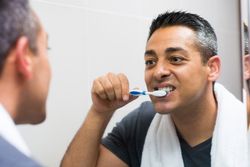The Do's & Don’ts of Handling COVID-19 Stress & Teeth Grinding

Stress is one of the leading causes of bruxism, more commonly known as teeth grinding. The COVID-19 pandemic, in particular, has spurred many feelings of anxiety among people of all ages in the past several months. Since stress can be a factor in the development or worsening of bruxism, excessive grinding of teeth may not be an unusual side effect. Looking after your mental health is particularly important right now, as is seeing a dentist to prevent further tooth damage if the habit is hard to break. Here’s a closer look at what to do—and what to avoid—if you’ve been grinding your teeth.
Do:
Find relaxation techniques.
There are many methods that people rely on to unwind and destress, particularly during moments of fear and panic. Exercising, meditating, and talking with a friend can be helpful and cathartic for some people.
Focus on relaxing the body, too, by setting aside some personal time every day. When you’re tensed tightly, the entire body clenches up.
Watch your habits.
 Tooth problems may be inevitable if chronic bruxism is left untreated. It can cause chips, aches, and leave the teeth more vulnerable to sensitivity and cavities. However, there are everyday steps that will improve dental health during this stressful time. Watch your sugar intake, brush and floss regularly, and visit the dentist for regular cleanings.
Tooth problems may be inevitable if chronic bruxism is left untreated. It can cause chips, aches, and leave the teeth more vulnerable to sensitivity and cavities. However, there are everyday steps that will improve dental health during this stressful time. Watch your sugar intake, brush and floss regularly, and visit the dentist for regular cleanings.
Don’t:
Avoid a mouthguard.
The thought of wearing a mouthguard at night may be intimidating, but it’s often the most valuable tool for those who grind their teeth habitually. This customized device is designed to separate the top and bottom rows to prevent them from being pressed together. It can also minimize strain on the jaw in the process. The dentist will fit the product precisely to your mouth’s dimensions so that it’s as comfortable as possible.
Clench your jaw.
It’s easier said than done, but try to focus on the way you hold your jaw and how your mouth feels during the day. When a body is tense, the jaws and teeth can become tense, too, which can cause you to grind them in response.
Be mindful of how you clench, and try to focus on releasing the pressure. Open your mouth and touch the tongue to the front of the teeth whenever you catch yourself clenching. This will raise awareness of the habit and bring some relief.
If you’re feeling stressed and are concerned about bruxism, turn to Dr. Robert N. Petrtyl, DDS, in Cincinnati, OH. This experienced dentist offers a variety of treatments to help relieve discomfort and protect your dental health, and the office follows social distancing guidelines with every patient during this time. Visit the website to find out about his cosmetic and general dentistry services, including teeth cleaning, fillings, and gum disease treatment. Call (513) 554-4657 to schedule an appointment today.
About the Business
Have a question? Ask the experts!
Send your question

